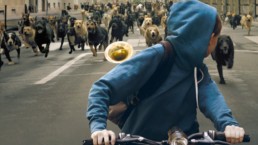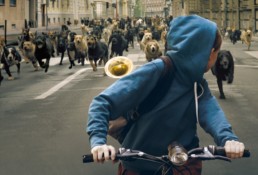Review: ‘White God’
A dog epic for the ages.
In White God, Hungarian director Kornél Mundruczó tells a thrilling and heartbreaking modern-day parable about the oppressions endured by lower-class people at the hands of those with power within society. The lower class people here in Mundruczó’s daring and bold film just happens to be non-human, real-life dogs – around two-hundred and fifty of which were involved in making this incredible genre-experiment of a film.
The winner of last year’s Cannes Award winner of the Un Certain Regard (an award given to films with various types of “original and different” visions and styles that work to seek international recognition), White God is nothing short of jaw-dropping in its ambition and ultimately realized vision. In Hungarian with English subtitles, the film transcends its European region to connect its message of politically and socially marginalized cultures to a universal level.
White God follows two youthful and innocent characters whose early first-hand experiences with injustice leads to full character changes into disillusioned and battle-hardened learners of the sometimes cruel real-world. First-time actor and thirteen year old Zsófia Psotta stars as Lili, a girl who is sent to live with her divorced father Daniel (Sándor Zsótéro) but brings her dog, (and the film’s second star) Hagen, a mixed-breed that is seen as an inconvenience to everyone except his loyal young owner. So when Daniels’s apartment manager learns of the dog and tells him of the state’s tax that must be paid for owning mixed-breeds, his frustrations give way to his doing away with Hagen, depositing him out of their car on the side of the road as a helpless Lili is left to watch Hagen grow out of sight, confused, abandoned, and alone.
At this point, the rest of the film brilliantly unfolds in cutting between Lili and Hagen in parallel-path narratives which track their journeys as they each struggle to navigate through their new and uncertain worlds. Lili, at first only slightly angstful, slowly shades into an authority-defying little anarchist in her own right, shown unbending to the wills of her father or band teacher’s hypocrisies, while continuing to search for Hagen. Hagen, meanwhile, is seen learning to live on the streets, struggling to cross streets with the zooming oncoming traffic, but soon enough encountering a pack of other canines in the city’s back alleys. These full, wordless sequences make this reviewer wonder how the on-set animal training and editing were combined to create these incredible scenes, some of the film’s most effective parts.
The sometimes painful events showing Hagen’s dog training and turn from innocent to aggressor stand out as the director’s statement on social unrest–that the indignities of the minority can only endure for so long before boiling over into revenge-like upheaval.
The film makes its statement in the events that come in its second act, as Hagen is shown subjected to the life of a stray within a society that fails to aid, making for continually saddening and sickening watching but entirely powerful. He is caught by a homeless man and sold to a dog-fighting trainer, who submits the dog to such despicable acts as beatings and other tortures to invoke his more beastial and primal anger. These painful-to-watch events ultimately leads to Hagen, now teeth baring and snarling, finally revolting along with a city’s worth of canine comrades, in a third act that best resembles Alfred Hitchcock’s The Birds and the city-takeover stylings of The Rise of the Planet of the Apes, where the film moves from social commentary to a type of exploitive-horror.
White Dog‘s emotional moments and truths here are heart-breaking in their display, as Mundruczó never shies away from showing the brutalities that Hagen endures at the hand of the more evil pawns of empowered society, the “white gods” that hold the power over those without any. The sometimes painful events showing Hagen’s dog training and turn from innocent to aggressor stand out as the director’s statement on social unrest–that the indignities of the minority can only endure for so long before boiling over into revenge-like upheaval.
Perhaps the film’s weaker, or rather, less stimulating component is its familiar structure outside of the draw of featuring live dogs to tell the story. But there is so much fire and kinetic friction from the very start that it’s fully rewarding when the dogs break free charging through the abandoned streets of Hamburg, terrorizing pedestrians and taking revenge on the film’s earlier antagonists. Here, though, things resolve a bit too easy, in final sequence that could have invoked even further boundary-pushing; though the entire journey of grueling emotional highs and lows will still leave audiences stunned.
White God should be considered essential viewing; past its excitement and successful gimmick of following a real dog’s life, the social issues, while still hitting familiar notes, realizes an empathy in us all that makes its point: until we can live together in society, things might get a little rough.
White God opens in Los Angeles at the Nuart Theatre this weekend.
Ryan Rojas
Ryan is the editorial manager of Cinemacy, which he co-runs with his older sister, Morgan. Ryan is a member of the Hollywood Critics Association. Ryan's favorite films include 2001: A Space Odyssey, The Social Network, and The Master.


